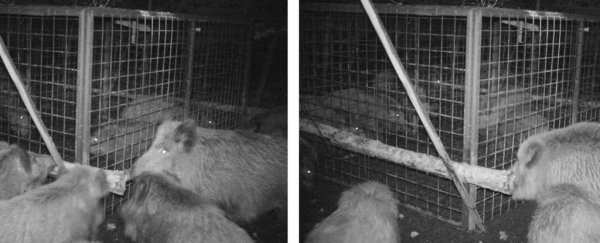A wild boar carried out a daring mission to free two piglets from a trap, demonstrating high levels of intelligence and empathy, a new paper published in Scientific Reports shows.
The incident, which occurred in January 2020, was documented by a team of scientists from the Czech University of Life Sciences at the Voděradské Bučiny National Nature Reserve.
The wild boar trap, which used corn as bait, had been set up to help researchers study prevention measures for African Swine Fever.
A camera captured images of two juvenile boars becoming entrapped together for two hours and 30 minutes.
A group of around eight wild boars eventually arrived at the site of the trap, led by one fully grown female boar.
In an attempt to free the trapped boars, the female boar charged at strategic points where wooden logs were blocking the doors of the trap.
The report said the female boar's mane was visibly erect, known as piloerection, which scientists said is an indication of distress.
Researchers said that it appeared that the other boars were attempting to help the female with the rescue operation.
Within six minutes of beginning the rescue attempt, the female boar released the first log blocking the front of the trap.
 (Masilkova et al., Scientific Reports, 2021)
(Masilkova et al., Scientific Reports, 2021)
The entire rescue mission lasted about 29 minutes, after which point the trap was released and the boars freed.
Researchers suggested that judging by the animals' size and gender, the female boar could have been the juvenile boars' mother.
Scientists believe this is the first documented case of wild boar demonstrating rescue behavior, which some consider a "complex form of empathy."
Rescue behavior has only been observed in a small number of animals, including rats and ants, the report said.
Scientists said that documenting rescue behavior in wild boars was not surprising, due to the animals' complex cognitive skills and social relationships.
In order for an act to be considered rescue behavior, it must meet four requirements.
The requirements include the victim being in distress, the rescuer putting themselves at risk, the actions of the rescuer being adequate to the victim's situation, and there is no immediate benefit or reward for the rescuer.
In this case, scientists said the female wild boar met all of the criteria.
Rescue behavior differs from other forms of helping by its complex organization, the report explained.
This article was originally published by Business Insider.
More from Business Insider:
